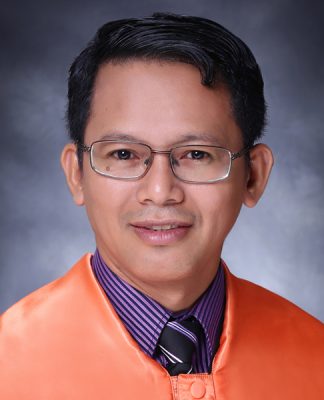FORMER College of Science dean Fortunato Sevilla III was conferred the title, "National Academician," by the National Academy of Science and Technology (NAST) during its 37th Scientific Meeting at the Manila Hotel last July 10.
Three other Science faculty members also got recognitions. Allan Patrick Macabeo was named Outstanding Young Scientist. Grecebio Jonathan Alejandro and Mary Beth Maningas were recognized for their Outstanding Scientific Papers. (See related story below.)
“Colleagues from the University of the Philippines (UP) who are already in the academy say it’s high time na may UST dito, that we get to see a different face,” Sevilla said, referring to the UP-dominated academy.
The title “academician” is one of the highest distinctions to be conferred on a scientist.
Conquering chemistry
Sevilla, who is also former research director of the UST Graduate School, was acknowledged for his pioneering work in chemical sensors and biosensors research in the country, as well as providing low-cost laboratory equipment and instruments.
After earning his Chemistry degree in the University, he acquired graduate degrees on Instrumentation and Analytical Science in the Manchester Institute of Science and Technology in England.
“The challenge was [for us] to be able to do the work that was being done in the United Kingdom,” he said, noting that his graduate degrees were newly introduced at the time and he thought the technology used in the field could be brought back to the country.
His colleague Macabeo, a trailblazer in the field of Chemistry, was recently conferred the Outstanding Young Scientist award for his contributions in sustainable biologically active and natural products from Philippine medicinal plants and agricultural by-products.
Macabeo was also awarded The World Academy of Sciences Prize for Young Scientists in the Philippines, which recognized Macabeo for his work in Organic Chemistry and granted him financial support for his research in a developing country like the Philippines.
“It may not be the Nobel Prize, but in a country where Chemistry is not popular, it gives recognition to [a] passion all the way from childhood,” he said in a statement.
Meeting global standards
With an eye for innovation, Sevilla gathered ways to produce low-cost equipment and to cut down unnecessary consumption of materials for researches. These equipment, he said, are now shared with schools from countries such as Mexico, Panama and China demanding affordable alternative equipment.
“[Cooperation] turned full-circle,” Sevilla said. “[What] they give you, you [also] give to others.”
Maningas, whose research on gene silencing and the White Spot Syndrome Virus merited an Outstanding Scientific Paper award, also garnered recognition in both the local and the international scientific community.
Her diagnostic kit for the virus, which has been plaguing the global shrimp industry by weakening shrimps, is set to be tested on local shrimp farms.
“The mechanism of shrimp response to viral infection is poorly understood,” she explained in a previous Varsitarian interview.
“There has not been any significant advance in finding effective means to control the virus’spread and effects.”
A cycle of learning
Sevilla said fruitful research stems from effective mentoring, with teachers passing down knowledge to students who will branch out their topics of focus.
“Maningas [studies shrimps], but she focused on one type of sickness. Look at Alejandro, [who tackles] taxonomy. It is a large field, but he focused on Rubiaceae."
Alejandro has also recently received an Outstanding Scientific Paper award for his study on Rubiaceae, a family of flowering plants such as coffee. His comprehensive work on taxonomy also netted him an Outstanding Young Scientist award back in 2006.
His extensive research also led him and his team of students to name various endemic Rubiaceae species, including Mussaenda ustii, named after the University, and Hedyotis papafranciscoi aptly named after Pope Francis.
Alejandro’s work on DNA barcoding has also established him as the pioneer in digitally preserving the country’s plant biodiversity.
Now holding the highest possible title for a scientist, Sevilla aims to stretch the country’s research potential and meet international standards.
“Training students to become researchers is a good indicator of success,” he said.
“The challenge for me is to have good graduate school training, good researches, and have a publication, exclusively from UST.”














